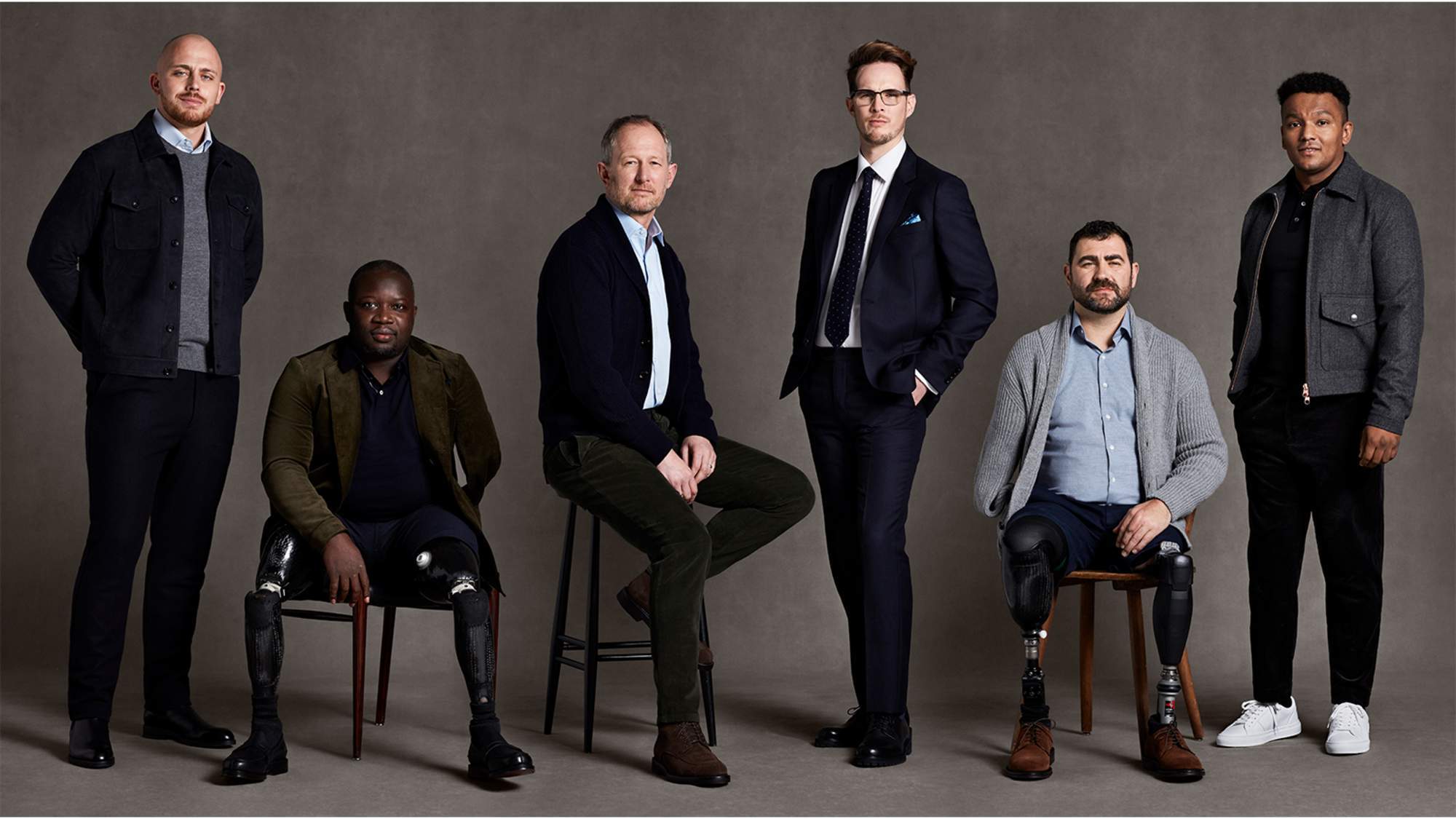
SIX VETERANS SHOW US THE TRUE MEANING OF STYLE - Mr Porter Journal
How Ms Emma Willis MBE’s Style For Soldiers campaign changed the lives of six ex-servicemen
People say that the strangest thing about losing a limb is that you can still feel it: blood coursing through your veins; the tingling of imaginary skin; tendons tugging in a hand that’s no longer there. An itch you quite literally cannot scratch. These so-called “phantom limb” sensations can persist for years after amputation. “I can feel the blood pumping, pumping but it has no place to go,” says Mr Lamin Manneh, looking down at the space where his left arm used to be. “My hand is squeezing tight, but I can’t open it.” An ex-infantryman with the Irish Guards, he lost the limb, along with both of his legs above the knee, to an improvised explosive device (IED) in Afghanistan in 2010. Like many veterans who have suffered the loss of limbs, these feelings have made it difficult for him to sleep.
Mr Manneh’s injuries, while severe, are far from exceptional for soldiers of his generation. According to figures published by the Ministry of Defence, a total of 301 UK service personnel have suffered amputations as a result of injuries sustained in Afghanistan since the start of the British military campaign in 2001. And while this number includes servicemen who lost as little as a fingertip, it also includes many who, like Mr Manneh, lost much more. Of that number, 113 – more than a third – were classed as SMAs, or “significant multiple amputees”, which means they lost at least two hands or feet. Mr Manneh, who had the misfortune of being deployed to Afghanistan during the bloodiest phase of the campaign, was one of 38 SMAs recorded that year.
Along with phantom limb sensations, amputees might also be surprised to find themselves struggling to regulate their temperature. This symptom, unlike the eerie tingling of an invisible limb, is at least a little easier to explain. Just imagine your arms and legs as bars on a radiator, drawing heat away from your body and into the air around you. Lose a limb, and you lose your ability to stay cool. This is one of the reasons why, if you ever meet someone with a prosthetic leg, you shouldn’t be surprised to see them wearing shorts – even in the depths of winter. For many, this is a statement of pride; for others, it’s a heads-up to fellow pedestrians who might otherwise assume that they are fully able-bodied. But it’s often for the simple reason that if they weren’t wearing shorts, they’d be too hot. “Remembrance Day is the only day of the year that I wear trousers,” says Mr Andy Reid MBE, another amputee who stepped on an IED in Afghanistan in 2009.
Injured former servicemen endure symptoms like these on a daily basis. Not all of them have to deal with the debilitating consequences of losing a limb, like Messrs Manneh and Reid. But there are plenty of other, less visible injuries that can still have a lifelong impact. That’s to say nothing of the psychological trauma of warfare, which can be just as devastating and hard to shift. Humans are a ferociously adaptable species, but war can test even the most resilient of us. Without a support network to fall back on, these veterans can struggle to readjust to civilian life and are vulnerable to depression and anxiety. This is where people such as Ms Emma Willis MBE come in.
Ms Willis made the first of what would be many visits to Headley Court in 2008 after learning of its existence from a radio programme on the conflict in Afghanistan. This old Victorian mansion on the outskirts of London was then the site of the British Army’s medical rehabilitation centre, where soldiers wounded in the line of duty would receive treatment for what were often life-changing injuries. And it was running at full capacity. The designer and shirtmaker was moved to tears by the stories of these young men, who had joined the military out of a sense of patriotic duty only to see their careers cut short in the most horrific of circumstances. As she learned of the profound struggle they faced on their journey to recovery, she pledged to do whatever she could to help. And for a shirtmaker, the answer was obvious: make shirts.
The following year, Ms Willis founded Style For Soldiers to provide servicemen with bespoke shirts that were adapted for their injuries. In the case of amputees, breathable fabrics were chosen to help them stay cool, and cufflinks, which are near-impossible to fasten with one hand, were modified with Velcro. These shirts didn’t just provide injured veterans a much-needed confidence boost. They also helped them prepare for civilian life and the daunting prospect of re-entering the job market. Now in its 10th year, Style For Soldiers has grown far beyond its original remit. Along with providing bespoke shirts and walking sticks, it now arranges events such as a recent exhibition showcasing art and poetry created by former servicemen suffering from post-traumatic stress disorder (PTSD), while its annual Christmas party is a highlight of the veterans’ calendar and has become the largest event of its kind.
Last month, in advance of the 2019 Christmas bash, MR PORTER was invited to dress, photograph and hear from some of the men that Style For Soldiers has helped over the years. It’s the first time we’ve done so since 2014, the year that British combat operations in Afghanistan officially ceased. A good occasion for a few old friends to get together and reminisce over war stories, it also served as a timely reminder that while the battle.
Article Continues at:
https://www.mrporter.com/en-gb/journal/the-portfolio/six-veterans-show-us-the-true-meaning-of-style/5263


Leave a comment
This site is protected by hCaptcha and the hCaptcha Privacy Policy and Terms of Service apply.